Related Research Articles
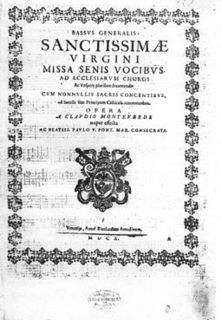
Vespro della Beata Vergine, SV 206, is a musical setting by Claudio Monteverdi of the evening vespers on Marian feasts, scored for soloists, choirs, and orchestra. It is an ambitious work in both scope and variety of style and scoring, and has a duration of around 90 minutes. Published in Venice as Sanctissimae Virgini Missa senis vocibus ac Vesperae pluribus decantandae, cum nonnullis sacris concentibus, ad Sacella sive Principum Cubicula accommodata, it is sometimes called Monteverdi's Vespers of 1610.

John Milford Rutter is an English composer, conductor, editor, arranger, and record producer, mainly of choral music.
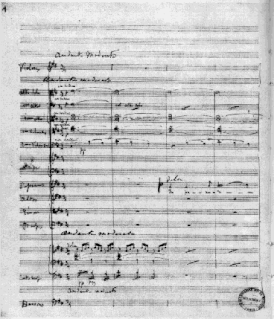
Gabriel Fauré composed his Requiem in D minor, Op. 48, between 1887 and 1890. The choral-orchestral setting of the shortened Catholic Mass for the Dead in Latin is the best-known of his large works. Its focus is on eternal rest and consolation. Fauré's reasons for composing the work are unclear, but do not appear to have had anything to do with the death of his parents in the mid-1880s. He composed the work in the late 1880s and revised it in the 1890s, finishing it in 1900.
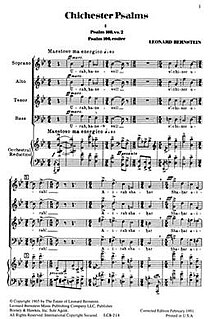
Chichester Psalms is an extended choral composition in three movements by Leonard Bernstein for boy treble or countertenor, choir and orchestra. The text was arranged by the composer from the Book of Psalms in the original Hebrew. Part 1 uses Psalms 100 and 108, Part 2 uses 2 and 23, and Part 3 uses 131 and 133. Bernstein scored the work for a reduced orchestra, but also made a version for a smaller ensemble of organ, one harp, and percussion.
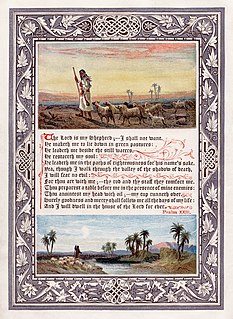
Psalm 23 is the 23rd psalm of the Book of Psalms, generally known in English by its first verse, in the King James Version, "The Lord is my Shepherd". The Book of Psalms is the third section of the Hebrew Bible, and a book of the Christian Old Testament. In the Greek Septuagint version of the Bible, and in its Latin translation in the Vulgate, this psalm is Psalm 22 in a slightly different numbering system. In Latin, it is known by the incipit, "Dominus reget me"

John Rutter's Requiem is a musical setting of parts of the Latin Requiem with added psalms and biblical verses in English, completed in 1985. It is scored for soprano, mixed choir and orchestra or chamber ensemble.
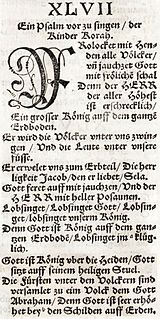
Psalm 47 is the 47th psalm of the Book of Psalms, generally known in English by its first verse, in the King James Version, "O clap your hands". The Book of Psalms is the third section of the Hebrew Bible, and a book of the Christian Old Testament. In the Greek Septuagint version of the bible, and in its Latin translation in the Vulgate, this psalm is Psalm 46 in a slightly different numbering system. In Latin, it is known as "Omnes gentes plaudite manibus". The psalm is a hymn psalm. It is one of twelve psalms attributed to the sons of Korah, and one of fifty-five psalms addressed to the "Chief Musician" or "Conductor".

Messiah, the English-language oratorio composed by George Frideric Handel in 1741, is structured in three parts. This listing covers Part II in a table and comments on individual movements, reflecting the relation of the musical setting to the text. Part I begins with the prophecy of the Messiah and his birth, shows the annunciation to the shepherds and reflects the Messiah's deeds on earth. Part II covers the Passion in nine movements including the oratorio's longest movement, an air for alto He was despised, then mentions death, resurrection, ascension, and reflects the spreading of the Gospel and its rejection. The part is concluded by a scene called "God's Triumph" that culminates in the Hallelujah Chorus. Part III of the oratorio concentrates on Paul's teaching of the resurrection of the dead and Christ's glorification in heaven.
Lobe den Herrn, meine Seele, BWV 143, is an early cantata by Johann Sebastian Bach. He appears to have composed the cantata for New Year's Day, probably when he was in his 20s, but whether it was first performed in Mühlhausen or Weimar is not known: the date of composition is unclear. Bach's authorship has been doubted because the cantata has several ununusual features; one of these is the scoring, it is the only Bach cantata to combine three corni da caccia with timpani.
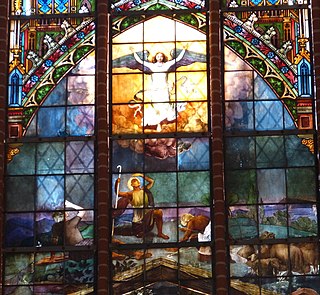
Angels' Carol is a popular sacred choral piece by John Rutter for Christmas. He wrote his own text, beginning "Have you heard the sound of the angel voices", three stanzas with the refrain "Gloria in excelsis Deo". It has been part of recordings of collections of Christmas music, including one conducted by the composer.

Antonio Vivaldi made several versions of his G minor setting of the Magnificat canticle. He scored his best known version, RV 610, for vocal soloists, four-part choir, oboes and string orchestra, which also exists in a version for two groups of performers. He based these versions on an earlier setting for voices and strings only (RV 610b). His ultimate version, in which some choral and ensemble movements are replaced by five arias, to be sung a cappella by girls from the Ospedale della Pietà orphanage, was catalogued as RV 611. The concise work is well suited for use in vesper services.
"The Lord bless you and keep you" is a classical sacred choral composition by John Rutter, based on Numbers 6:24-26. It is a setting of a biblical benediction, followed by an extended "Amen". Rutter scored the piece for four vocal parts (SATB) and organ. He composed it in 1981 for the memorial service of Edward T. Chapman, the director of music at Highgate School, London, with whom he had studied when he attended the school.

The Magnificat by John Rutter is a musical setting of the biblical canticle Magnificat, completed in 1990. The extended composition in seven movements "for soprano or mezzo-soprano solo, mixed choir, and orchestra " is based on the Latin text, interspersed with "Of a Rose, a lovely Rose", an anonymous English poem on Marian themes, the beginning of the Sanctus and a prayer to Mary. The music includes elements of Latin American music.

Tre Motetter, FS 139, Op. 55, is a composition for unaccompanied choir by Carl Nielsen. It is a setting of three quotations in Latin from different psalms chosen by the composer and his wife Anne Marie Carl-Nielsen. The three motets, Afflictus sum, Dominus regit me and Benedictus Dominus were first performed on 11 April 1930 at the Ny Carlsberg Glyptotek by Mogens Wöldike and the Palestrina choir, to whom they are dedicated. Among the composer's last works, they were published in 1931 by the Skandinavisk Musikforlag in Copenhagen.

Der 100. Psalm, Op. 106, is a composition in four movements by Max Reger in D major for mixed choir and orchestra, a late Romantic setting of Psalm 100. Reger began composing the work in 1908 for the 350th anniversary of Jena University. The occasion was celebrated that year with the premiere of Part I, conducted by Fritz Stein on 31 July. Reger completed the composition in 1909. It was published that year and premiered simultaneously on 23 February 1910 in Chemnitz, conducted by the composer, and in Breslau, conducted by Georg Dohrn.

Super flumina Babylonis, Op. 25, is a musical setting of Psalm 137 in Latin by Jules Van Nuffel, composed in 1916 for mixed choir and organ.
Melvin Donald Olson was an American choral conductor who is known for introducing the compositions by John Rutter to the United States.
O clap your hands is an anthem in English for choir and organ by John Rutter. He composed the setting of verses from Psalm 47 in 1973 for a four-part choir and organ, and also made a version with orchestra. It was first published in 1973. Later, Rutter included it in Psalmfest, a collection of nine psalm settings.
Antonio Vivaldi composed several settings of the Dixit Dominus, the Latin version of Psalm 110. They include a setting in ten movements for five soloists, double choir and orchestra, RV 594, another setting in eleven movements for five voices, five-part choir and orchestra, RV 595, and a recently discovered setting in eleven movements for five soloists, choir and orchestra, RV 807, which had been attributed to Baldassare Galuppi. It is said to be one of his "most significant sacred works."

Psalm 150 is a psalm setting by César Franck. He wrote the composition, setting Psalm 150 for four-part choir, orchestra and organ, in 1883. It was published in 1896 by Breitkopf & Härtel. Carus-Verlag published an arrangement for choir, strings and organ. The incipit in French is "Halleluiah! Louez le Dieu, caché dans ses saints tabernacles".
References
- ↑ "John Rutter / The Lord is my shepherd / Vocal score". Oxford University Press. 1978. Retrieved 28 February 2017.
- 1 2 3 John Rutter / The Lord is my shepherd. Oxford University Press. 1978.
- 1 2 3 Vernier, David (2014). "Rutter's Joyful Psalmfest". classicstoday.com. Retrieved 28 February 2017.
- ↑ Quinn, John (2016). "John Rutter (b. 1945) / Psalmfest (1993)". musicweb-international.com. Retrieved 28 February 2017.